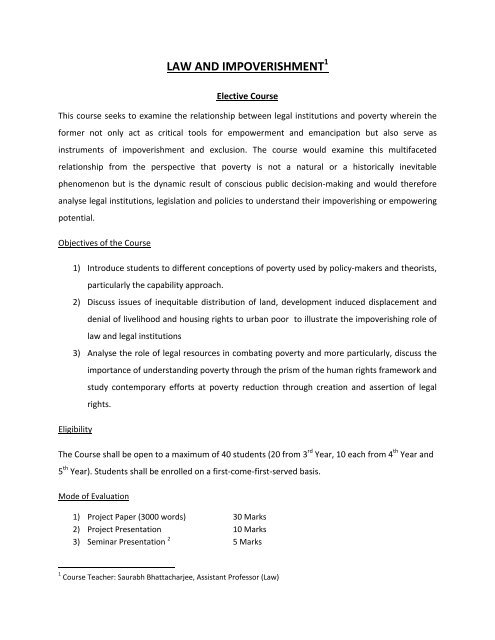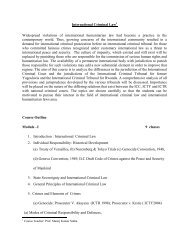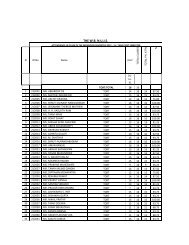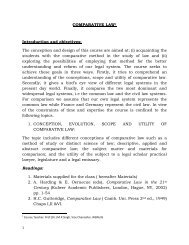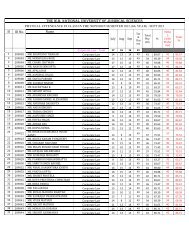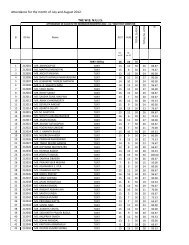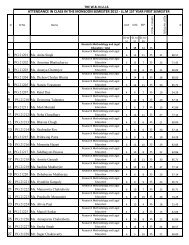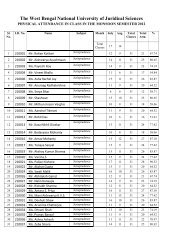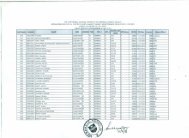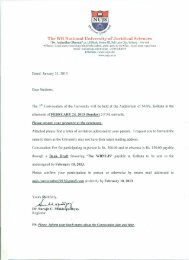Law and Impoverishment - Course Outline
Law and Impoverishment - Course Outline
Law and Impoverishment - Course Outline
Create successful ePaper yourself
Turn your PDF publications into a flip-book with our unique Google optimized e-Paper software.
5. Smita Narula, The Right to Food: Global Actors Accountable under International <strong>Law</strong>, 44Colum. J Transnat’l L. 691‐724 (2006)6. Thomas Pogge, Recognized <strong>and</strong> Violated by International <strong>Law</strong>: The Human Rights of theGlobal Poor, 18 Leiden Journal of International <strong>Law</strong>, 717‐721 (2005)Cases1. TN Godavarman v Union of India2. Narmada Bachao Andolan v Union of India3. Butu Prasad Kumbhar v SAIL 1995 Supp 2 SCC 2254. Ram Lakhan v State, Criminal Revision Petition No 784 of 2006, Date of Judgment:December 5, 2006, available at http://indiankanoon.org/doc/434096/ 137(2007)DLT1735. Manushi Sangathan v Govt. of Delhi, Writ Petition (Civil) No. 4572/2007, Date of Judgment:January 10, 2010, 68(2010)DLT1686. Almitra Patel v Union of India, 1998) 2 SCC 4167. Sodan Singh v NDMC AIR 1989 SC 19888. Genda Ram v MCD 2010 (11) SCALE 36Further Readings1. S. Muralidhar, <strong>Law</strong>, Poverty <strong>and</strong> Legal Aid: Access to Criminal Justice, (LexisNexis‐Butterworths, 2004), 255‐2722. L<strong>and</strong> Acquisition Bill, 2007, PRS legislative brief available athttp://www.prsindia.org/uploads/media/L<strong>and</strong>%20Acquisition/bill167_20080311167Legislative_Brief__L<strong>and</strong>_Acquisition_Bill.pdfModule 3: Legal Empowerment <strong>and</strong> Poverty: The Jurisprudence of Rights‐based Approach (10Classes)This module shall examine the use <strong>and</strong> potential of law as an instrument for poverty reduction <strong>and</strong>empowerment. More specifically, we shall discuss the importance of underst<strong>and</strong>ing povertythrough the prism of the human rights framework, the overlap between international human rights<strong>and</strong> poverty eradication <strong>and</strong> weaknesses of the right‐based approach.
- The scope <strong>and</strong> content of rights‐based approaches to poverty alleviation- International Human rights <strong>Law</strong> <strong>and</strong> Poverty- Opposition to Poverty as Human Rights- Indivisibility of Rights- Rights, Poverty <strong>and</strong> Judicial Review- Capabilities <strong>and</strong> RightsReadings1. Centre for Economic <strong>and</strong> Social Rights, Human Rights <strong>and</strong> Poverty: Is Poverty a Violation ofHuman Rights? Human Rights Insights No.1, available at 2. Henry Shue, Basic Rights: Subsistence, Affluence <strong>and</strong> US Foreign Policy (2 nd ed., PrincetonUniversity Press, 1996), 13‐29, 35‐643. Steiner, Alston <strong>and</strong> Goodman, International Human Rights in Context: <strong>Law</strong>, Politics, Morals,(3 rd ed., OUP, 2007), 294‐3474. Srilatha Batliwala, When Rights Go Wrong, Seminar January 2007,5. Aryeh Neier, Social <strong>and</strong> Economic Rights: A Critique, 13/2 Hum. Rts. Brief. (2006)6. David Bilchitz, Poverty <strong>and</strong> Fundamental Rights: The Justification <strong>and</strong> Enforcement of Socio‐Economic Rights (Oxford, 2007), 119‐1327. Martha Nussbaum, Capabilities as Fundamental Entitlements: Sen <strong>and</strong> Social Justice inCapabilities, Freedom <strong>and</strong> Equality: Amartya Sen’s Work from a Gender Perspective,(Agarwal, et al ed., Oxford:2007), 42‐47Cases1. Olga Tellis v Bombay Municipal Corporation AIR 1986 SC 1802. PUCL v Union of India (2001)3. Government of the Republic of South Africa v Grootboom 2000 (11) BCLR 1169 (CC)4. Minister of Health v Treatment Action Campaign (2002)Further Readings1. F.B. Cross, Error of Positive Rights, 48 UCLA L. Rev. 857 (2001)
2. Mark Tushnet, Social Welfare Rights <strong>and</strong> Forms of Judicial Review, 82 Texas <strong>Law</strong> Review1895 (2003)3. Ellie Palmer, Judicial Review, Socio‐Economic Rights <strong>and</strong> the Human Rights Act, (Oxford,2007), 11‐48Module 4: Welfare, Activism <strong>and</strong> <strong>Law</strong> Reforms: Institutional Issues in Tackling Poverty Through<strong>Law</strong> (10 classes)The module shall examine legislative, judicial <strong>and</strong> policy attempts towards poverty eradicationthrough legal empowerment at national <strong>and</strong> international level <strong>and</strong> critically analyse theseexperiments <strong>and</strong> identify their strengths <strong>and</strong> weaknesses <strong>and</strong> their potential for replication.1. Constitutional, judicial <strong>and</strong> legislative efforts towards rights assertion• Right to Food• Right to Work• Right to Housing1. Social Action Litigation2. Legal Aid <strong>and</strong> Access to Justice3. Welfare <strong>and</strong> Labelling4. Cash Transfers <strong>and</strong> Public ServicesReadings1. Jean Dreze, Democracy <strong>and</strong> the Right to Food in Human Rights <strong>and</strong> Development: TowardsMutual Reinforcement (Alston <strong>and</strong> Robinson ed., OUP, 2005), 45‐642. Philip Alston <strong>and</strong> Nehal Bhuta, Human Rights <strong>and</strong> Public Goods: Education as a FundamentalRight in India, in Human Rights <strong>and</strong> Development: Towards Mutual Reinforcement (Alston<strong>and</strong> Robinson ed., OUP, 2005), 242‐2683. Armin Rosencranz, The Forest Rights Act 2006: High Apsirations, Low Realization, 50 (4) JILI656 (2008)4. Gopinath Reddy et al, Issues Related to Implementation of the Forest Rights Act in AndhraPradesh, Economic <strong>and</strong> Political Weekly, 46 (18), April 30, 2011, 735. Indira Hirway, NREGA After Four Years: Building on Experiences to Move Ahead, The IndianJournal of Labour Economics, Vol. 53, No.1, p. 113 (2010)
6. Nick Robinson, Closing the Implementation Gap, The Hindu, March 12, 20117. Upendra Baxi, The Avatars of Indian Judicial Activism: Explorations in the Geographies of(In)Justice in Fifty Years of the Supreme Court: Its Grasp <strong>and</strong> Reach (Verma, Kusum ed.,Oxford, 2000), 156‐1658. S. Muralidhar <strong>and</strong> Ashok Desai, Public Interest Litigation: Potential <strong>and</strong> Problems in Supremebut not Infallible ‐ Essays in Honour of the Supreme Court of India (B.N. Kirpal et al. eds, NewDelhi: Oxford University Press, 2000), p. 1599. Mamta Rao, Public Interest Litigation: Legal Aid <strong>and</strong> Lok Adalats, (EBC:2010), 340‐37910. Herbert J. Gans, The War Against the Poor, (Basic Books, 1993), 68‐73, 106‐10911. Mihir Shah, Direct Cash Transfer: No Panacea By Itself, The Hindu, September 20, 200812. Jayati Ghosh, The Siren Song of Cash Transfers, The Hindu, March 03, 201113. Guy St<strong>and</strong>ing, Give Cash Some Credit, Indian Express, May 28, 2011Cases5. Olga Tellis v Bombay Municipal Corporation AIR 1986 SC 1806. PUCL v Union of India (2001)7. Government of the Republic of South Africa v Grootboom 2000 (11) BCLR 1169 (CC)8. Minister of Health v Treatment Action Campaign (2002)Further Readings1. Laura Rawlings <strong>and</strong> Gloria Rubio, Evaluating the Impact of Conditional Cash TransferProgrammes, World Bank Research Observer, Vol. 20 (1), 29‐55 (2005)2. Das, Toan‐Do <strong>and</strong> Ozler, Reassessing Conditional Cash Transfer Programmes, World BankResearch Observer, Vol. 20 (1), 57‐80 (2005)3. Ellie Palmer, Judicial Review, Socio‐Economic Rights <strong>and</strong> the Human Rights Act, (Oxford,2007), 42‐484. S. Muralidhar, <strong>Law</strong>, Poverty <strong>and</strong> Legal Aid: Access to Criminal Justice, (LexisNexis‐Butterworths, 2004), 1‐7, 24‐28, 375‐3965.
LEAD QUESTIONS FOR EACH MODULEMODULE 1CONCEPTUALISING AND DEFINING IMPOVERISHMENT1. How do we underst<strong>and</strong> <strong>and</strong> comprehend poverty?2. Are the traditional forms of conceptualising poverty adequate?3. Should we conceive of poverty in purely economic terms?4. Does Baxi’s thesis on impoverishment allow for a more comprehensive underst<strong>and</strong>ing or is itsutility limited only to the realm of rhetoric?5. What are the advantages of Amartya Sen’s conceptualisation of poverty as capabilitydeprivation?6. What are the connections between Baxi’s claims <strong>and</strong> Sen’s conceptualisation of poverty ascapability deprivation7. Do Iris Young <strong>and</strong> Rehman Sobhan further the Baxian thesis on impoverishment as a structuralprocess?8. Does Iris Young give us an alternative model to evaluate state policies <strong>and</strong> their connectionswith impoverishment?MODULE 2LAW AS A DETERMINANT OF IMPOVERISHMENT1. What is the nexus between l<strong>and</strong> reforms <strong>and</strong> impoverishment?2. Are state institutions complicit in the current agrarian <strong>and</strong> rural crisis in India?3. What are the linkages between the development agenda <strong>and</strong> impoverishment? Are suchlinkages essential <strong>and</strong> inherent to the development process?4. How do current statutory <strong>and</strong> administrative institutions foster this linkage betweendevelopment <strong>and</strong> deprivation?5. Does our dominant paradigm of environmental protection serve to exclude various sections ofIndian citizenry
6. What is the role of the judiciary in creating a paradigm of environmental protection <strong>and</strong> urbanplanning that disenfranchises the urban poor7. How is denial of economic freedom a cause of impoverishment <strong>and</strong> what are the legalrestrictions that have been imposed on the economic freedom of identified sections of thecitizenry?8. Are the claims that criminal law operates differently on the impoverished persuasive <strong>and</strong> wellsubstantiated?9. On what basis do Smita Narula <strong>and</strong> Thomas Pogge implicate international legal <strong>and</strong> financialorder in production <strong>and</strong> perpetuation of poverty?MODULE 3LEGAL EMPOWERMENT AND POVERTY: THE JURISPRUDENCE OF RIGHTS‐BASED APPROACH1. What are the differences between rights‐based approach <strong>and</strong> economic or policy centredapproaches to poverty?2. Is it proper to see poverty as a human rights issue?3. Why were classical thinkers reluctant to view poverty as a human rights issue?4. Is the distinction between civil‐political <strong>and</strong> socio‐economic rights sustainable?5. Does the structure of rights <strong>and</strong> duties drawn by Henry Shue impose any obligations on nonstateactors?6. What is the import of the distinction between accidental deprivation <strong>and</strong> essential deprivation,especially with regard to the issues discussed in the previous module?7. Do proponents of rights‐based approach adequately respond to concerns expressed oninstitutional limitations of judiciary?8. What are the various ways in which international bodies <strong>and</strong> national court have tried to bridgethe gap between poverty issues <strong>and</strong> human rights discourse?9. Are the criticisms levelled against rights‐based approach best applied to constitutionalisation ofsocio‐economic rights or are they applicable to statutory rights too?10. Does rights‐based approach further the capability approach articulated by Sen, Nussbaum <strong>and</strong>others?
MODULE 4WELFARE, ACTIVISM AND LAW REFORMS: INSTITUTIONAL ISSUES IN TACKLING POVERTYTHROUGH LAW1. Does the Indian experience with Right to Food <strong>and</strong> Right to Education help us in evaluating thearguments for <strong>and</strong> against rights‐based approaches?2. Do we find echoes of Varun Gauri in Philp Alston <strong>and</strong> Jean Dreze’s assertions on Indianexperiment with judicial affirmation of socio‐economic rights3. Can we draw any insights from the initial assessments of the MNREGA <strong>and</strong> the Forest Rights Acton the relevance of rights‐based approach to poverty?4. What is the role of legal aid <strong>and</strong> SAL/PIL in anti‐poverty discourse?5. What are the concerns that Baxi, Muralidhar have raised against the trajectory of PIL/SAL?6. What are the weaknesses of the major legal aid institutions in India?7. Are the arguments expressed in favour of Conditional Cash Transfers persuasive?


